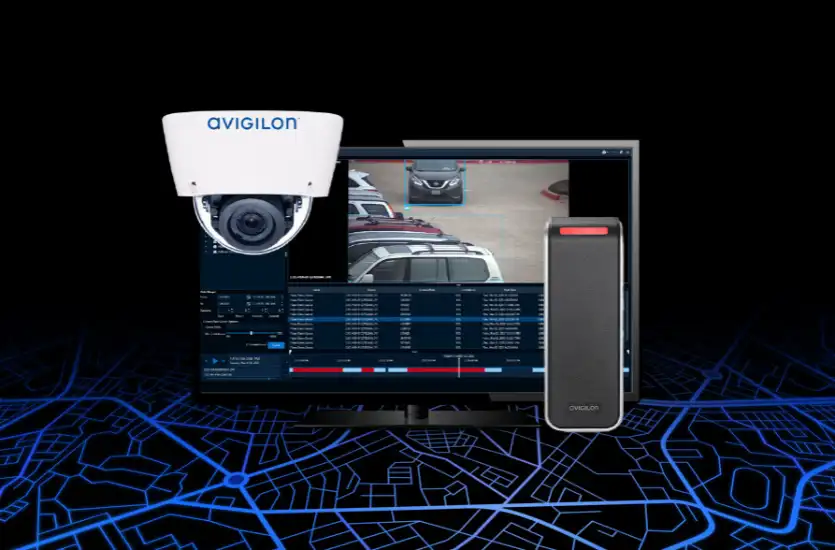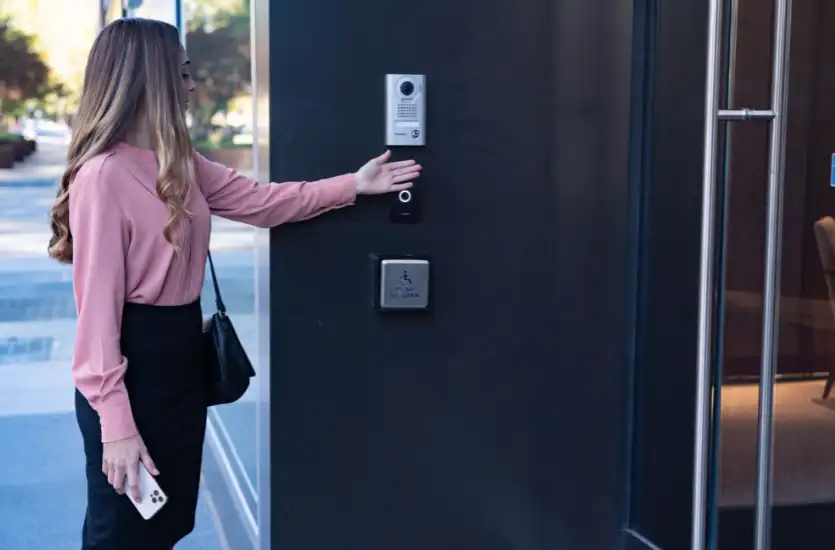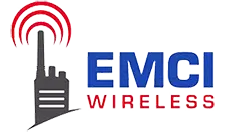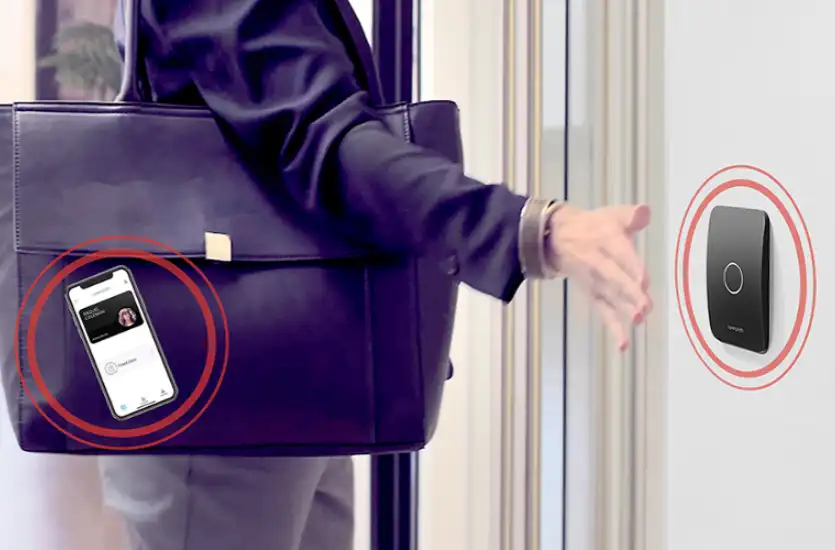Today’s business owners want to make sure that their businesses are protected all day, every day. And for commercial businesses in particular, this means controlling who comes in and who leaves and knowing what time of day those activities occur. That’s why the access control system market has become so large—expected to reach approximately $15 billion by 2029.
At EMCI Wireless, we focus on providing communication solutions and security systems that help businesses operate at peak performance in the safest manner possible. In this article, we’ll tell you what you need to know about how an access control system can protect not just your commercial building but critical infrastructure, too.
What is an Access Control Solution?
Access control systems are security tools designed to regulate who can enter, exit, or move through a building or specific areas within it. By using credentials such as cards, codes, or biometric data, these systems grant or restrict access to protect people, assets, and information. They are widely used to help businesses manage security and monitor activity, creating safer and more organized spaces.
Core Components
Modern access control systems use a variety of tools and technologies to manage entry points. These include:
- Access Cards/Key Fobs: Physical devices that grant entry when scanned.
- Biometrics: Advanced security measures like fingerprint or facial recognition.
- Keypads and PIN Systems: Require users to input a secure code for entry.
- Mobile Access: Allow users to unlock doors or gates via smartphone apps.
- Centralized Management Software: Enables administrators to monitor and adjust access permissions from a single interface.
Types of Access Control Systems
Depending on a business’s needs, different types of access control systems may be implemented:
- Discretionary Access Control (DAC): Provides flexibility, allowing the owner to assign permissions.
- Mandatory Access Control (MAC): A strict system where a central authority assigns access and user permissions.
- Role-Based Access Control (RBAC): This system grants access based on job roles and responsibilities.
Examples of Access Control Applications
Access control systems are found in diverse settings. For instance, power plants and water treatment facilities use them to restrict sensitive areas, while hospitals and corporate offices use them to safeguard staff and data while tracking movement throughout the premises.
Why are Access Control Systems so Important for Infrastructure and Commercial Buildings?
We hear it on the news all the time—another cyberattack. We hear about how this company or that company has been exposed to a data breach. And the statistics are a bit alarming. In the third quarter of 2024 alone, there were an estimated 422 million records exposed as a result of data breaches.
These breaches come at a sizeable cost. Data from Statista suggested that the typical cost of a data breach in 2024 was around $4.8 million. Figures like this can fold companies, not to mention eroding trust in companies that manage to stay in operation.
With security threats constantly evolving, businesses and infrastructure operators must take proactive steps to protect their assets and data. While cybersecurity often takes the spotlight, physical security is just as important in preventing unauthorized access to sensitive areas. Access control systems act as a first line of defense, creating secure environments where businesses can operate without interruption or risk to their reputation.

Improved Security Against Unauthorized Access
Access control systems prevent unauthorized personnel from entering restricted areas, protecting sensitive equipment, data, and operations. By requiring valid credentials for entry, these systems significantly reduce the risk of theft, sabotage, or breaches that could compromise operations or customer trust.
Supporting Regulatory Compliance
Many industries, such as healthcare, finance, and energy, must meet stringent security regulations. Access control systems help businesses meet these requirements by limiting access to authorized individuals and generating detailed logs of who entered and exited key areas.
Improved Operational Oversight
These systems provide administrators with a clear view of access patterns and activity. This oversight helps businesses identify inefficiencies, improve workflows, and establish accountability within their operations.
Preparedness for Emergencies
Access control systems help businesses manage emergencies by enabling features such as lockdowns, controlled evacuations, or prioritizing access for emergency responders. These capabilities support quick action when time is of the essence, reducing the impact of potential crises.
Emerging Technologies in Access Control
The field of access control is evolving quickly, driven by advancements that prioritize both convenience and security. From integrating smart devices to utilizing advanced analytics, these technologies are reshaping how businesses approach access management. These innovations don’t just secure buildings—they ultimately evolve how spaces are used, managed, and protected.
Integration with IoT and Smart Building Systems
The internet of things—aka IoT—devices bring new functionality to access control by enabling communication between systems like surveillance, lighting, and HVAC. This integration allows businesses to centralize operations, making it easier to manage security and environmental controls simultaneously, tailored to specific areas or times of the day.
AI and Machine Learning Applications
Artificial intelligence adds predictive capabilities to access control. By analyzing patterns, AI can identify unusual activity, alert administrators to potential risks, and automate decisions about access permissions. This layer of intelligence strengthens the system’s ability to adapt to changing security needs over time.
Mobile-First Access Solutions
Smartphones have become a central part of access control systems. With mobile credentials, users can open doors or access restricted areas using apps, eliminating the need for physical cards or fobs. Mobile access not only simplifies the process for users but also provides administrators with flexibility in managing credentials remotely.
Cloud-Based Access Management
Cloud-based systems, such as Avigilon’s cloud-native access control system, offer scalability and ease of management. With these platforms, businesses can control access permissions, view logs, and monitor activity from anywhere with an internet connection. This approach is particularly valuable for companies managing multiple locations or needing to update access rights frequently.

Tailoring Access Control Solutions for Different Industries
Access control systems, such as those provided by EMCI Wireless, offer flexible options to meet the unique requirements of different sectors. From safeguarding sensitive data in office environments to protecting physical assets in energy facilities, these systems adapt to the challenges specific to each industry. Below, we examine how access control can serve both critical infrastructure and commercial buildings with precision and reliability.
Access Control for Critical Infrastructure
In industries like utilities, transportation, and public safety, access control systems protect areas housing essential services and sensitive equipment. For example:
- Power Plants: Limit access to control rooms, substations, and hazardous areas to authorized personnel only.
- Water Treatment Facilities: Protect chemical storage zones and operational areas to prevent tampering or unauthorized activity.
- Transportation Hubs: Regulate access to restricted areas, including train yards, air traffic control towers, and maintenance zones.
These systems also help meet compliance standards by providing detailed records of personnel movements and securing areas against unauthorized intrusion.
Access Control for Commercial Buildings
In the commercial sector, access control serves a dual purpose: securing operations and managing the flow of employees and visitors. Key applications include:
- Corporate Offices: Restrict entry to sensitive departments like IT, HR, and finance while allowing easy access to communal spaces.
- Retail and Hospitality: Control access to stockrooms, back offices, and employee-only areas to safeguard inventory and maintain privacy.
- Healthcare Facilities: Protect patient data by securing access to medical records rooms and limiting entry to areas requiring specialized clearance, such as operating rooms or pharmaceutical storage.
By customizing access control systems, businesses create tailored security measures that address their specific operational and security needs.
The Role of EMCI Wireless in Access Control
EMCI Wireless has been a trusted provider of communication and security solutions for decades. With a commitment to innovation, we specialize in tailoring access control systems that meet the unique challenges of both critical infrastructure and commercial spaces. We’re confident that our deep industry expertise positions us as a go-to resource for businesses seeking reliable security solutions.
Expertise in Security Solutions
Our team works closely with clients to identify vulnerabilities and design access control systems that fit their operational requirements. We make sure that every system is optimized for maximum effectiveness, from planning to installation.
Customized Access Control Systems
Every business has unique security requirements, and we’re dedicated to delivering tailored solutions. Whether a multi-location corporation or a single-site facility, our Aviglon access control systems are designed to address specific challenges, from managing employee access to safeguarding high-risk areas.
Ongoing Support and Maintenance
Security doesn’t stop at installation. We provide comprehensive support and maintenance to help businesses maintain their access control systems at peak performance. We offer troubleshooting, updates, and periodic evaluations to prioritize long-term reliability of all Motorola products we sell.
Are You Ready to Protect Your Infrastructure and Commercial Buildings?
Every day that businesses delay protecting their infrastructure and buildings, the more they open themselves up to theft, data breaches, and other safety concerns. If you’re ready to get started with an access control system that minimizes these risks, contact us today for a free consultation.






